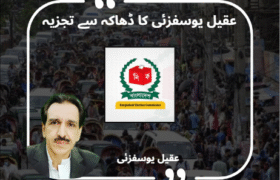Like every year, Kashmir Solidarity Day is being observed today, on 5th February, in Pakistan and across the world where Kashmiris and Pakistani diaspora exists. The day is a significant annual occasion, as it is marked as a show of solidarity with the people of Indian-administered Kashmir and to express support for their right to self-determination. The day serves as a reminder to the world about the forgotten promise made to strand Kashmiris about 73 years ago by United Nations Security Council (UNSC). It also holds significance in the context of prevailing human rights situation inside the Valley, where Indian occupying forces are committing heinous crimes against humanity.
There have been numerous human rights violations in Indian-administered Kashmir, including the use of excessive force by security forces, restrictions on freedom of speech and assembly, and the arbitrary detention of individuals without trial. Additionally, there have been regular incidents of torture, extrajudicial killings, and enforced disappearances by Indian occupying forces on a daily basis. Indian government always denies the reports of these crimes by its forces, but at the same time, Kashmir is a no-go area for the international press so that they can verify facts independently.
The Kashmir issue was a political dispute initially between India and Pakistan, but due to Indian hegemonic designs and repeated denial of the appeals for right of self-determination by local Kashmiris turned it into a human crisis. After August 2019’s actions by Delhi when articles 35-A and 370 of the Indian constitutions were removed from the constitution by BJP/RSS Hindu supremacist government, Kashmiri Muslims are faced with a real threat of extinction. This is neither a conspiracy theory nor political rhetoric, instead, this is writing on the wall considering the actions of the Indian government, promises and sloganeering of RSS/VHP gangs, and criminal silence by the international community. Indian actions of August 2019 were aimed to find a lasting solution to the issue where India wants to change the demography of the region so that a phoney plebiscite can be held in the valley as promised by India in UNSC. But the issue becomes a far more serious human rights problem when analyzed in the context of the overall approach of RSS/BJP/VHP-led government towards Indian Muslims, even within mainland India.
There is hardly a doubt left that the present Indian government is not only creating the environment of mass genocide of Muslims in India, but it’s also acting as a partner in crime as many of the sitting Ministers in the Indian government are holding public rallies inciting Hindu masses to carry out slaughter of local Muslims. Many Hindu fanatic leaders holding political positions have promised to eradicate all Muslim populations from India, including Jammu and Kashmir. The Indian government has already divided the region into two union territories based on religious demography. Jammu is a majority Hindu territory while the Valley is dominated by a Muslim population. This division is also an indicator that India is preparing for a charade plebiscite after changing the demography of Kashmir for which permits for residents are being issued to Indian army, police, paramilitary forces and others to buy properties. There is a clear and present danger that Kashmiris will meet the same fate on their own lands which Palestinians met.
Kashmir is a regional stability issue as well. Since BJP’s being in power, India has tried many times to stir a regional conflict using false flag operations. Starting the Parliament attack in 2001 to 26/11 to the Pulwama attack in 2019 were all done by hardcore militant Hindu extremist elements within the Indian military establishment on the behest of their political leaders within the Indian political elite. Pakistan and India came to the brink of a nuclear exchange in 2019 when India for the first time, since 1971, used its air power against Pakistan. Pakistan’s prompt reply and clear determination of thwarting any misadventure kept Indian nefarious designs in check and the region avoided a massive humanitarian crisis. But the question remains how long this difficult peace between India and Pakistan will prevail in the presence of the Hindutva ruling elite and protracted unsolved issues like Kashmir?
Usually, Kashmir Solidarity Day is marked with speeches, rallies and demonstrations across Pakistan and Azad Jammu and Kashmir to raise awareness about the issue and ongoing human rights violations by Indian occupying forces. It’s high time for Pakistan to revisit the strategy to highlight Kashmir as a serious human rights and security issue across the world. Pakistan needs to engage with global media more proactively about Indian future designs and seek alliances with international partners with credible voices to highlight this issue in foreign societies instead of relying on old bilateral engagements with other countries. We need to create local pressures from as many countries as possible so that the world can act in a meaningful manner on Kashmir instead of giving diplomatic statements where usually Pakistan gets the blame due to India’s bigger economic clout. New challenges demand innovation in statecraft and Kashmir is the lifeline of Pakistan strangled by India, there are no reasons for us to keep striving to showcase what India has been doing there for decades. One venue of this fight is social media where a lot can be done to highlight the core issue, Pakistan’s principled stance, and the plight of common Kashmir due to Indian atrocities.



